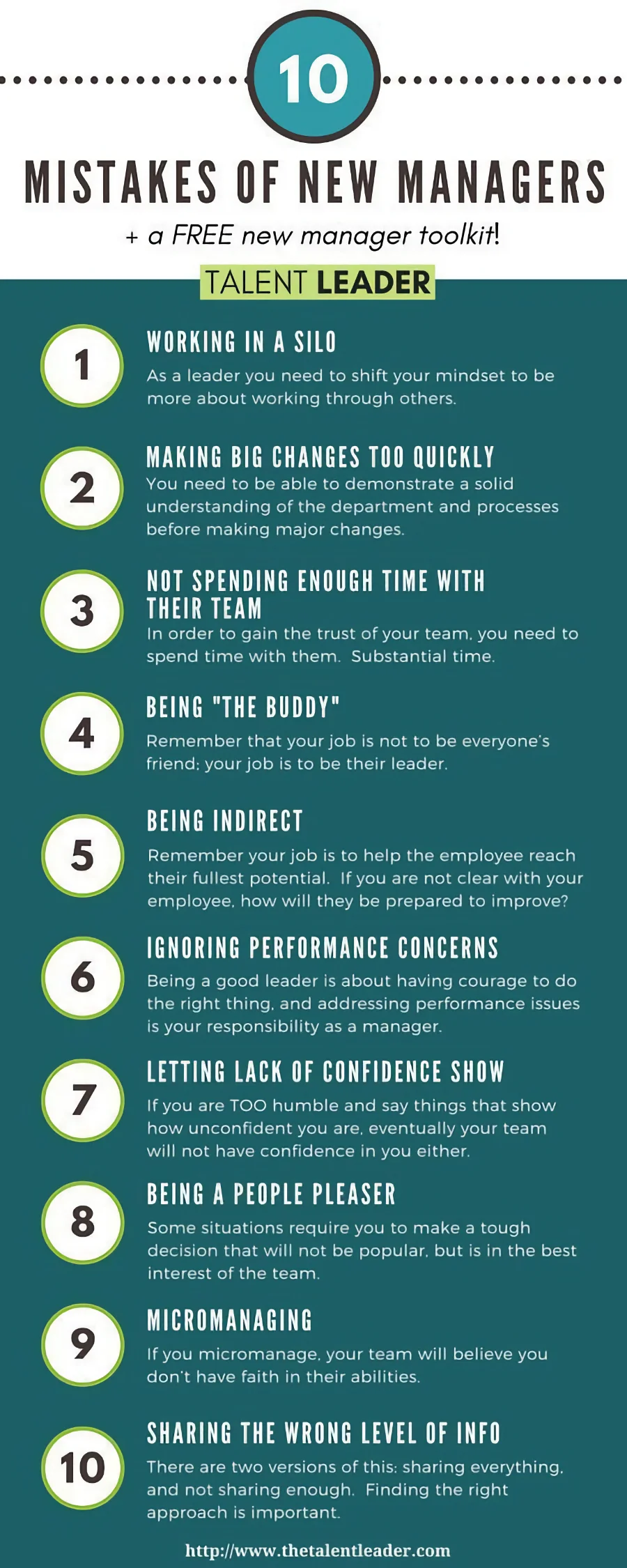10 Mistakes of New Managers
Being a new manager is exciting and challenging. It’s an opportunity to lead a team and make a positive impact on the organization. However, it can also be a daunting experience, especially if you’re not familiar with the expectations and responsibilities that come with the role.
In this article, we’ll discuss ten common mistakes made by new managers, and provide some tips on how to avoid them.
Mistake #1: Working in silo
When you’re a new manager, you may feel like you need to prove yourself by doing everything on your own. However, this can lead to a lack of communication and collaboration with your team. Working in silos can create inefficiencies, duplication of efforts, and hinder progress. To avoid this mistake, make sure you communicate regularly with your team and involve them in decision-making processes. This can help build trust and create a sense of ownership in the work.
Mistake #2: Making big changes too quickly
As a new manager, you may have grand ideas on how to improve processes and procedures in the team. However, implementing big changes too quickly can be overwhelming for your team and may lead to resistance. To avoid this mistake, take the time to understand the current processes and procedures and identify areas that need improvement. Involve your team in the process and make small incremental changes that are manageable and sustainable.
Mistake #3: Not spending enough time with their teams
As a new manager, you may be focused on meeting deadlines and achieving targets. However, it’s essential to spend time with your team to understand their needs, strengths, and weaknesses. Not spending enough time with your team can lead to a lack of engagement and morale. To avoid this mistake, schedule regular one-on-one meetings with your team members to discuss their work, goals, and concerns. This can help build trust and foster open communication.
Mistake #4: Being “the buddy”
It’s natural to want to be liked by your team, but being too friendly can lead to blurred boundaries and can make it difficult to make tough decisions. To avoid this mistake, maintain a professional relationship with your team while being approachable and empathetic. It’s essential to strike a balance between being friendly and being authoritative.
Mistake #5: Being indirect
As a new manager, you may be uncomfortable giving direct feedback or addressing performance concerns. However, being indirect can lead to confusion and misunderstandings. To avoid this mistake, provide clear and constructive feedback to your team. Be specific about what needs improvement and provide actionable steps to help your team members grow.
Mistake #6: Ignoring performance concerns
It can be challenging to address performance concerns with team members, but ignoring them can lead to a decline in productivity and morale. To avoid this mistake, address performance concerns as soon as they arise. Provide constructive feedback and work with your team members to develop a plan to improve.
Mistake #7: Letting lack of confidence show
As a new manager, you may feel pressure to prove yourself and may be hesitant to make decisions. However, letting your lack of confidence show can undermine your credibility and authority. To avoid this mistake, take the time to understand your role and responsibilities as a manager. Seek feedback and support from your peers and mentors to help build your confidence.
Mistake #8: Being a people pleaser
It’s natural to want to make your team happy, but being a people pleaser can lead to a lack of accountability and can make it difficult to make tough decisions. To avoid this mistake, be firm and fair in your decision-making. Communicate your expectations clearly and hold your team accountable for their work.
Mistake #9: Micromanaging
Micromanaging can be tempting for new managers who want to ensure everything is done perfectly. However, it can lead to a lack of trust and autonomy for your team members. To avoid this mistake, delegate tasks to your team members and trust them to complete them. Provide support and guidance when needed, but allow your team members to take ownership of their work.
Mistake #10: Sharing the wrong level of information
As a new manager, you may struggle to find the right balance between transparency and confidentiality. Sharing too much or too little information can lead to confusion and mistrust. To avoid this mistake, be transparent about the information that is relevant to your team. Communicate clearly and consistently to ensure that everyone is on the same page.
Conclusion
Being a new manager comes with its own set of challenges. However, by avoiding these ten common mistakes, you can build a strong and effective team. Remember to communicate regularly with your team, provide clear and constructive feedback, and strike a balance between being friendly and being authoritative. With time and practice, you can become a successful and respected leader.
